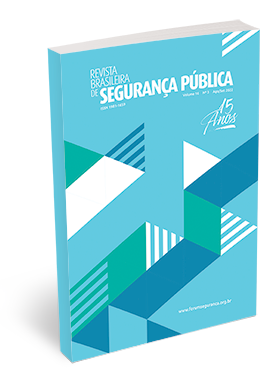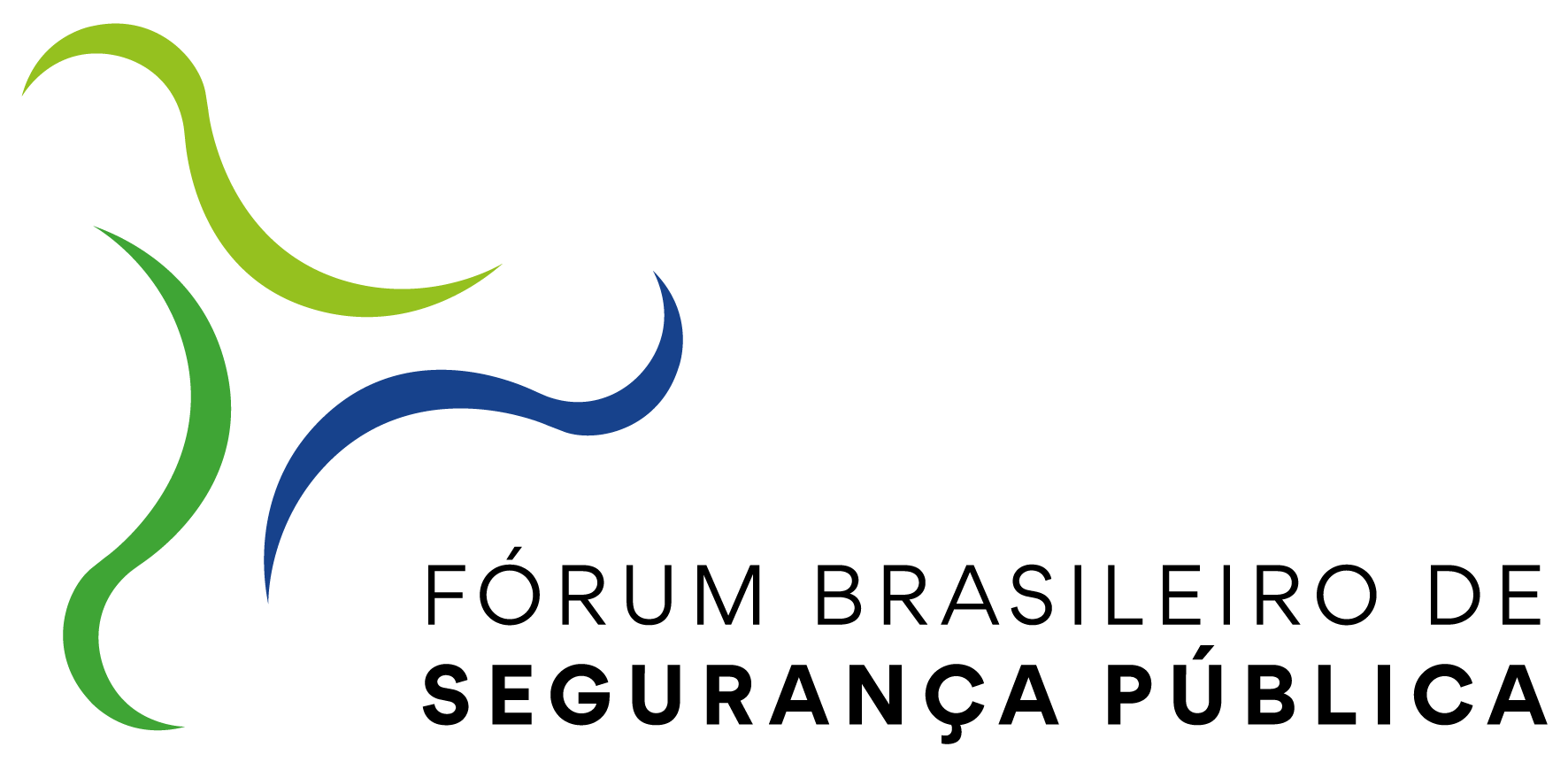Os impactos da pandemia de COVID-19 nas atividades policiais
uma revisão integrativa
DOI:
https://doi.org/10.31060/rbsp.2022.v16.n3.1609Palavras-chave:
Pandemia, COVID-19, Polícia, Revisão IntegrativaResumo
O presente artigo tem como objetivo organizar e analisar os estudos nacionais e internacionais que investigam os impactos da pandemia de COVID-19 nas atividades policiais. Como forma metodológica de seleção dos estudos, adotou-se a revisão integrativa. Após a aplicação dos critérios de inclusão e exclusão resultou na seleção de 26 artigos, que apresentaram como principais resultados, a necessidade de intervenções e projetos voltados para preservação da saúde mental dos policiais e a oportunidade de as instituições policiais repensarem seu papel e relação com a comunidade. Verificou-se também a necessidade de desenvolvimento de mais pesquisas voltadas para os impactos do COVID-19 na atividade policial.
Downloads
Referências
ABORISADE, Richard A. Accounts of Unlawful Use of Force and Misconduct of the Nigerian Police in the Enforcement of COVID-19 Measures. Journal of Police and Criminal Psychchology, v. 36, Feb. 2021, p. 450-462.
ALARCÓN-ZAYAS, Violeta; BOUHABEN, Miguel-Alfonso. Pandemic/Screen. The visual motif of police violence in public spaces during the COVID-19 pandemic. Special Issue: Visual motifs and representations of power in the public sphere, vol. 34, i. 2, 2021, p. 297-313.
ALCADIPANI, Rafael et al. Street-level bureaucrats under COVID-19: Police officers’ responses in constrained settings. Administrative Theory & Praxis, v. 42, 2020, p. 1-10.
ASHBY, Matthew P J. Changes in Police Calls for Service During the Early Months of the 2020 Coronavirus Pandemic. Policing: A Journal of Policy and Practice, vol. 14, i. 4, Dec. 2020, p. 1054–1072.
BERNARDINO, Regina C.; BERNARDINO, Adriana V. S. Fatores estressores que influenciam na qualidade de vida, gerando danos à saúde do policial militar. Revista Mosaico, vol. 09, n. 2, Jul./Dez. 2018, p. 02-09.
BEZERRA, Anselmo C. V. et al. Fatores associados ao comportamento da população durante o isolamento social na pandemia de COVID-19. Ciência & Saúde Coletiva [online], v. 25, suplementar 1, 2020, p. 2411-2421.
BOOVARAGASAMY, Chithra et al. COVID-19 and police personnel: An exploratory community based study from South India. Journal of family medicine and primary care, vol. 10, i. 2, Feb. 2021, p. 816-819.
BRASIL. Constituição (1988). Constituição da República Federativa do Brasil. Brasília, DF: Centro Gráfico, 1988.
BRITO-MARQUES, Janaína M. A. M. et al. Impact of COVID-19 pandemic on the sleep quality of medical professionals in Brazil. Arquivos de Neuro-Psiquiatria [online], v. 79, i. 2, 2021, p. 149-155, 2021.
CHUGHTAI, Omar Rasheed et al. Frequency of COVID-19 IgG Antibodies among Special Police Squad Lahore, Pakistan. Journal of the College of Physicians and Surgeons Pakistan, vol. 30, i. 07, July 2020, p. 735-739.
DAI, Mengliang et al. The Impact of Lockdown on Police Service Calls During the COVID-19 Pandemic in China. Policing: A Journal of Policy and Practice, vol. 15, i. 3, September 2021, p. 1867-1881.
DE CASTILHO LOPES, Eliza M.; PEREIRA LEITE, Lucia. Deficiência adquirida no trabalho em policiais militares: significados e sentidos. Psicologia & Sociedade, Minas Gerais, vol. 27, núm. 3, 2015, p. 668-677.
DEY, Arindam et al. COVID-19 pandemic lockdown-induced altered sleep/wake circadian rhythm, health complaints and stress among traffic police personnel in India. Chronobiology International, vol. 38, i. 1, 2021, p. 140-148.
FERNANDES, Alan; LIMA, Renato. Informação e ciência como melhores aliados dos profissionais da segurança pública para o combate à COVID-19. In: FÓRUM BRASILEIRO DE SEGURANÇA PÚBLICA. Anuário Brasileiro de Segurança Pública: 2021. São Paulo: FBSP, 2021, p. 300-303
FRAGA, Cristina K. Peculiaridades do trabalho policial militar. Revista Virtual Textos & Contextos, nº 6, dez. 2006, p. 1-19.
FRENKEL, Marie O. et al. The impact of the COVID-19 pandemic on European police officers: Stress, demands, and coping resources. Journal of Criminal Justice, vol. 72, Jan-Feb, 2021, p. 101756.
GANONG, Lawrence H. (1987), revisões integrativas da pesquisa em enfermagem. Res. Nurs. Saúde, vol. 10, 1987, p. 1-11.
GARBARINO, Sergio et al. Suicide mortality data from the Italian police during the COVID-19 pandemic. Annals of General Psychiatry 20, v. 28. 2021, p. 1-3.
GROVER, Sandeep et al. Psychological Impact of COVID-19 Duties During Lockdown on Police Personnel and Their Perception About the Behavior of the People: an Exploratory Study from India. International journal of mental health and addiction, v. 1-12, Nov. 2020, p. 831-842.
GUJSKI, Mariusz et al. Prevalence of Current and Past SARS-CoV-2 Infections among Police Employees in Poland. Journal of clinical medicine, vol. 9, I. 10, Jun.-Jul. 2020, p. 3245.
HERNÁNDEZ-VÁSQUEZ, Akram; AZAÑEDO, Diego. COVID-19 in Peru: the need to pay attention to the high number of police deaths due to the pandemic. J Public Health (Oxf). v. 42, I. 3, Sep. 2020, p. 640-64.
HUANG, Qiufeng et al. An Exploratory Study of Police Officers’ Perceptions of Health Risk, Work Stress, and Psychological Distress During the COVID-19 Outbreak in China. Frontiers in Psychology, vol. 12, March 2021, p. 1-8.
IBGE – INSTITUTO BRASILEIRO DE GEOGRAFIA E ESTATÍSTICA. Censo demográfico. Rio de Janeiro. 2010.
IBGE – INSTITUTO BRASILEIRO DE GEOGRAFIA E ESTATÍSTICA. Perfil dos estados e dos municípios brasileiros: Pesquisa de informações básicas estaduais; Pesquisa de informações básicas municipais. Rio de Janeiro. 2014.
JIANG, Qi. Stress response of police officers during COVID-19: A moderated mediation model. Journal of Investigative Psychology and Offender Profiling, vol. 18, i. 2, 2021, p. 116-128.
JONES, Daniel J. The Potential Impacts of Pandemic Policing on Police Legitimacy: Planning Past the COVID-19 Crisis. Policing: A Journal of Policy and Practice, vol. 14, i. 3, September 2020, p. 579–586.
KHADSE, Pawan A. et al. Mental Health Impact of COVID-19 on Police Personnel in India. Indian Journal of Psychological Medicine, vol. 42, i. 6, 2020, p. 580-582.
LIPP, Marilda E. N.; LIPP, Louis M. N. Stress e transtornos mentais durante a pandemia da COVID-19 no Brasil. Bol. - Acad. Paul. Psicol., v. 40, n. 99, dez. 2020, p. 180-191.
LIPP, Marilda N.; MALAGRIS, Lúcia E. N. Estresse: Aspectos históricos, teóricos e clínicos. In B. Rangé (Ed.), Psicoterapias cognitivo-comportamentais: Um diálogo com a Psiquiatria. Porto Alegre: Artmed, 2011, p. 617-632.
LÓPEZ-GARCÍA, Guillermo. Vigilar y castigar: el papel de militares, policías y guardias civiles en la comunicación de la crisis del Covid-19 en España. Profesional De La Información, v. 29, n. 3, may. 2020, p. 1-15.
LOTTA, Gabriela et al. A pandemia de Covid-19 e os policiais brasileiros (Nota técnica). São Paulo, SP: Fórum Brasileiro de Segurança Pública.
MASKÁLY, Jon et al. Policing the COVID-19 Pandemic: Exploratory Study of the Types of Organizational Changes and Police Activities Across the Globe. International Criminal Justice Review, vol. 31, i. 3, Apr. 2021, 266-285.
MATARAZZO, Gustavo et al. Organizações policiais frente à pandemia: sensemaking, liderança e discricionariedade. Revista de Administração Pública [online], vol. 54, n. 4, 2020, p. 898-908.
MATTEI, Lauro; HEINEN, Vicente L. Impactos da crise da Covid-19 no mercado de trabalho brasileiro. Brazilian Journal of Political Economy [online], vol. 40, n. 4, 2020, p. 647-668.
MINAYO, Maria C. S.; ADORNO, Sérgio. Risco e (in)segurança na missão policial. Ciência & Saúde Coletiva [online], vol. 18, n. 3, 2013, p. 585-593.
OKON, Ubong A. et al. Knowledge, risk perception and adherence to COVID-19 prevention advisory among police officers in Makurdi Metropolis Benue State, 2020. The Pan African medical journal, vol. 38, Feb. 2021, p. 1-18.
PNUD - PROGRAMA DAS NAÇÕES UNIDAS PARA O DESENVOLVIMENTO. Relatório do Desenvolvimento Humano 2020. New York: Organização das Nações Unidas, 2020.
RACIBORSKI, Filip et al. Prevention of SARS-CoV-2 Infection Among Police Officers in Poland—Implications for Public Health Policies. International Journal Environmental Research Public Health, vol. 17, i. 23, Dez. 2020, p. 1-16.
RAMOS, Maély Ferreira Holanda. Modelo Social Cognitivo de Satisfação no Trabalho e Eficácia Coletiva: Percepções sobre a Docência. 239 f. Doutorado / Núcleo de Teoria e Pesquisa do Comportamento, Universidade Federal do Pará (UFPA), 2015.
RISTEVSKA-DIMITROVSKA, G.; BATIC, D. P.863 The impact of COVID-19 on mental health of healthcare workers and police/army forces in the Republic of North Macedonia. European Neuropsychopharmacolog, vol. 40, supplemente 1, Nov. 2020, p. s479.
SETYADI, Yusuf. Social And Security Impact Of Covid-19 Outbreak In West Kalimantan Based On The Police Law Perspective. SYARIAH: Jurnal Hukum dan Pemikiran, vol. 20, i. 1, Jun. 2020, p. 14-27.
SILVA, David F. O. et al. Prevalência de ansiedade em profissionais da saúde em tempos de COVID-19: revisão sistemática com metanálise. Ciência & Saúde Coletiva [online], vol. 26, n. 02, 2021, p. 693-710.
SOUZA, Marcela T. de; SILVA, Michelly Dias da; CARVALHO, Rachel de. Integrative review: what is it? How to do it?. Einstein (São Paulo) [online], vol. 8, n. 1, 2010, p. 102-106.
SPODE, Charlotte B.; MERLO, Álvaro R. C. Trabalho policial e saúde mental: uma pesquisa junto aos Capitães da Polícia Militar. Psicologia: Reflexão e Crítica [online], vol. 19, n. 3, 2006, p. 362-370.
STOGNER, John et al. “Police Stress, Mental Health, and Resiliency during the COVID-19 Pandemic.” American journal of criminal justice: AJCJ, vol. 45, Jun. 2020, p. 718-730.
TEIXEIRA, Carmen F. S. et al. A saúde dos profissionais de saúde no enfrentamento da pandemia de Covid-19. Ciência & Saúde Coletiva [online], vol. 25, n. 9, 2020, p. 3465-3474.
WHITE, Michael D.; FRADELLA, Henry F. Policing a Pandemic: Stay-at-Home Orders and What they Mean for the Police. American Journal of Criminal Justice, vol. 45, Jun. 2020, p. 702–717.
YUAN Lili, et al. A Survey of Psychological Responses During the Coronavirus Disease 2019 (COVID-19) Epidemic among Chinese Police Officers in Wuhu. Risk Manag Healthc Policy, vol. 13, Nov. 2020, p. 2689-2697.
Publicado
Como Citar
Edição
Seção
Licença
Copyright (c) 2022 Revista Brasileira de Segurança Pública

Este trabalho está licenciado sob uma licença Creative Commons Attribution 4.0 International License.
Licenciamento
A Revista Brasileira de Segurança Pública usa a Licença Creative Commons como forma de licenciamento para suas obras publicadas. A licença utilizada segue o modelo CC BY 4.0 - Attribution 4.0 International.
Para consultar os dirietos permitidos direcione-se para a licença completa ou para a nossa página de Direitos dos autores e Licenças.



